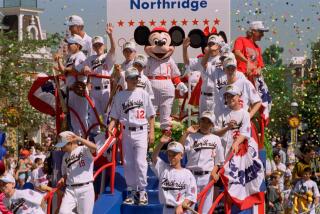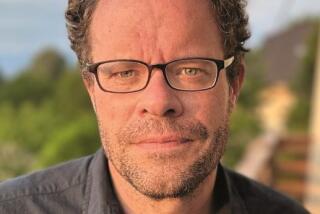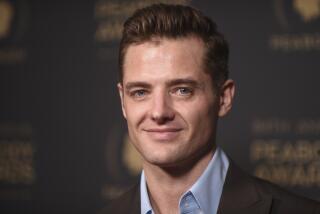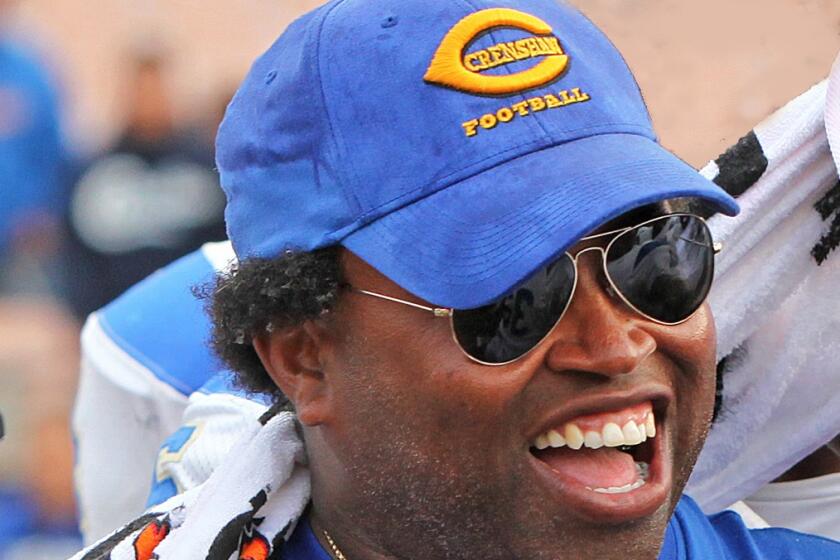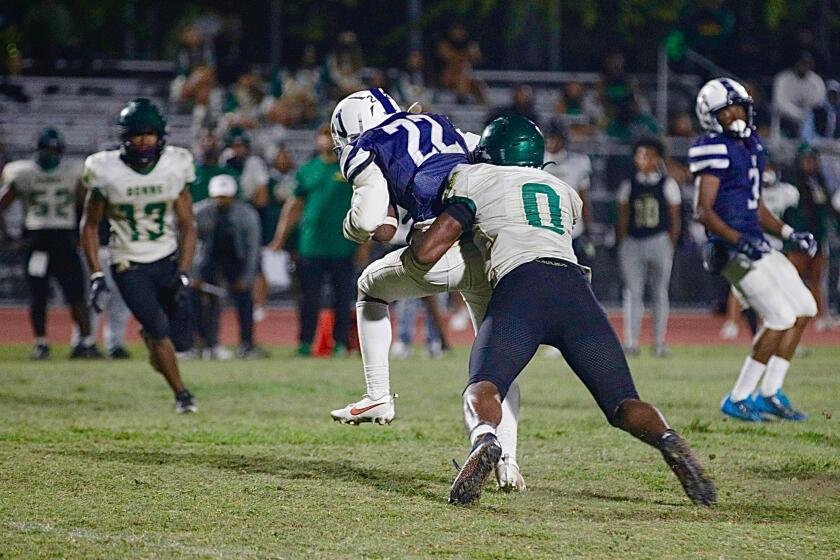PRIDE OF THE TIGERS : Outfielder Is Deaf, but That Hasnât Stopped Him From Hearing Major League Cheers
The crack of the bat. The roar of the crowd. The litany of cliches that reflect the sounds of baseball.
Curtis Pride doesnât hear any of it, but feels all of it.
Take Sept. 17, 1993.
Pride, the fifth deaf player in major league history, a man frequently judged by his disability instead of his ability, delivered his first major league hit on that date, a pinch-hit double for the Montreal Expos against Bobby Thigpen of the Philadelphia Phillies.
A crowd of 45,757 at Olympic Stadium responded with a standing ovation, prompting third base coach Jerry Manuel to walk out to second base to talk with Pride, who doesnât sign but reads lips and is easily understood.
âHe was telling me to take off my helmet and at first I thought, âWhatâs wrong with my helmet; is it dirty or something?â â Pride, now with the Detroit Tigers, said recently.
âThen I realized what he was getting at.â
Pride took his helmet off and waved it to the crowd, acknowledging the cheers he could not hear--or could he?
âI could hear it here,â Pride said, pointing to his heart.
âItâs something Iâll never forget. I have it on tape and it still brings tears to my eyes.
âI remember standing on second base and kind of reliving my whole life--being born deaf, having to fight to get the chance to play T-ball, spending seven years in school before being mainstreamed, spending eight years in the minors, almost quitting a year earlier, battling, sticking with my dream and finally making it.
âIt was very gratifying.â
This year has been gratifying in another way--his first full season in the majors.
He is a part-time left fielder with the Tigers. He is a full-time inspiration.
The letters bring acknowledgment of the role Pride, 27, has played in the lives of people battling disabilities around the world.
In Detroit and elsewhere around the American League, Pride and the Tigers try to satisfy requests for appearances and meetings with deaf children.
On Monday, with the Tigers in Anaheim, Pride spoke to children at the Providence Speech and Hearing Center in Orange. During the winter, he is a special education instructor in the Montgomery County (Md.) school system.
Ultimately, Pride said he wants to apply his finance degree from William & Mary to a business endeavor that he hasnât decided on yet, but âIâll always continue to give back to the community for the support Iâve received from friends, teachers, coaches and family.
âIf I can help one person experience the same opportunities and feelings Iâve had, it will make me happy. I tell kids to work hard, set goals and stay positive. Work hard, and good things will happen. Thatâs my motto.â
Pride may have wondered about those good things at times, but he never stopped working. Born deaf after his mother contracted German measles while pregnant, he has forged a life that is all Pride and mostly joy.
âMy attitude is that Iâm very lucky to be alive and in good health,â he said. âWith rubella, there can be retardation, deformity, even death.
âLook at it this way: I donât hear it when fans boo me.â
John Pride, who works for the U.S. Department of Health and Human Services, said his son never had to be pushed, was always self-motivated.
âHeâs always maintained a positive attitude,â the senior Pride said.
âThere are obviously some things he canât do because of his deafness, but he never looked on it as a deterrent athletically.â
Concerned about his disability, the Silver Spring, Md., boys club refused to let the 7-year-old Pride play T-ball until threatened with legal action.
Coaches were soon lobbying for his services.
At 17, Pride played for the U.S. 18-and-under soccer team at the 1985 World Championships in China. He went to William & Mary on a basketball scholarship and was a four-year starter at point guard while playing summers in the New York Metsâ farm system as a 10th-round draft choice in 1986.
That dual pursuit, along with a series of injuries, may have slowed Prideâs baseball development. He was released by the Mets after batting .227 at double-A Binghamton (N.Y.) in â92, a year that was his low point.
âI played miserably. My teammates made fun of me, mocking the way I talk, and I broke up with my girlfriend,â Pride said.
âI almost quit, but in the off-season I went back and talked to the kids at my high school, and they made such a big deal about playing minor league ball and telling me what an inspiration I was to them that they actually became my inspiration, convincing me I couldnât throw away the dream.
âI also talked to my dad, who said he didnât raise his son to be a quitter and that I had to continue believing in my ability, to be strong mentally.â
Pride signed with the Expos as a minor league free agent and had nine at-bats with the major league team in September of â93, getting that first hit.
Injuries in the spring of â94 ruined his chances for advancement that year, and he batted .175 in 48 games with the Expos in â95, after which he rejected a triple-A assignment to become a free agent. Pride said he weighed an offer to play in Japan before accepting a spring-training invitation with the overhauling Tigers.
âI didnât know much about him, other than his disability,â Manager Buddy Bell said. âI assumed he had a lot of determination and [I] was right about that. He was aggressive, intelligent and showed us he could hit the fastball.â
A left-handed hitter, Pride emerged from a field of about 13 outfielders to win a backup role.
He has since provided energy, speed and toughness as a reserve, said Bell, who added: âHeâs always ready.â
Pride has hit .277 with four triples and four homers in 137 at-bats, .304 in the last 125.
However, Bell said, for Pride to play regularly, he has to improve defensively.
âI donât think Curtis would like me to make an excuse, but I will,â Bell said. âThe crack of the bat has so much to do with how an outfielder breaks that it may take him longer to develop the way he needs to. Thereâs no reason to believe he canât, considering what heâs overcome.â
Said Pride: âI have to use judgment. If I call for a ball, I have to catch it because I canât hear the center fielder call me off, but Iâve never had a collision. I just have to be aware of whatâs going on at all times. The lack of hearing has made my other senses more acute.â
There have been occasions, however, when some have interpreted his deafness as a lack of intelligence and assumed his disability diluted his ability.
But, he added, he knew his time would come, and âI know it will come as a regular.â
âAll I ever wanted was for people to show the same confidence in my ability that I have in it,â Pride said.
âAll I ever wanted was to be treated like a good ballplayer, not like a deaf ballplayer.
âIf I had been given the opportunity with the Expos that Iâve been given with the Tigers, I could have produced in the same way.
âI donât want to be part of a negative history [that the Tigers are in the process of writing], but Iâm having fun, happy to be back in the majors. I feel like Iâve come a long way. I feel like Iâve established myself.â
The mocking he received from teammates in the minors is also behind him, Pride said, adding: âIt was a shame, but something I had to live with.â
Now Pride exchanges good-natured jibes with teammates, who recently gave him the Chan Ho Park treatment, escorting him through Canadian customs in tattered clothes--rookie treatment for the player who lost his rookie status as an Expo.
Asked if he is familiar with any of the deaf players who preceded him in the majors, Pride cited outfielder William âDummyâ Hoy, whose 14-year career began in 1888, and said: âHe belongs in the Hall of Fame, and I want to make people aware of that. He changed the game for everybody.â
It is generally acknowledged that Hoyâs deafness led to the use of managerial and coaching signs, and influenced umpires to use hand signals while making calls on the bases and behind the plate.
Pride laughed and said he can relate to that, saying that he once took a glancing pitch off his batting helmet in the minors and started to first base only to see the coach waving him back. Pride turned and saw the umpire making a sign to indicate the pitch had glanced off his bat.
He returned to the plate to discuss the issue and asked the umpire to take his mask off, wanting to read his lips.
The umpire didnât understand why Pride wanted the mask off and refused. A frustrated Pride finally took hold of the mask and tried to lift it off, only to have it snap back against the umpireâs face.
The mortified Pride drew an immediate ejection that was corrected when Prideâs manager came out to explain what his player was trying to do.
Call it another learning experience. Pride does.
âI never try to take the umpireâs mask off any more,â he said with a smile.
More to Read
Go beyond the scoreboard
Get the latest on L.A.'s teams in the daily Sports Report newsletter.
You may occasionally receive promotional content from the Los Angeles Times.
